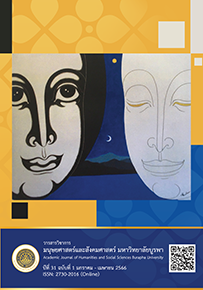Influence of Twitter Usages towards Subjective Well-Being: The Moderated Mediation Effect of Self-Esteem and Perceived Social Support
Main Article Content
Abstract
The main purpose of this study is to examine the relationship between the behavior of the active use of Twitter among university students and their subjective well-being, as well as exploring the influences of self-esteem as a mediator and perceived social support as a moderator. The participants of this study comprised 207 students, with 43 males and 164 females, aged 18-22, and studying in Chulalongkorn University. The moderated mediation analysis was used to test and estimate the causal relationship among self-esteem as a mediator, perceived social support as a moderator, active use of Twitter, and subjective well-being. The results revealed that the participants’ behavior of active use of Twitter had no influence significantly on their self-esteem. Also, the participants’ self-esteem did not account for the relationship between the behavior of the active use of Twitter and their subjective well-being. Moreover, it was shown that the perceived social support as the moderator had no influence on the participants’ active use of Twitter and self-esteem. Finally, the influence of perceived social support was found on the relationship between the participants’ behavior of the active use of Twitter and subjective well-being. The moderation model accounted for 62% of the variance in subjective well-being.
Downloads
Article Details

This work is licensed under a Creative Commons Attribution-NonCommercial-NoDerivatives 4.0 International License.
บทความทุกบทความเป็นลิขสิทธิ์ของวารสารวิชาการมนุษยศาสตร์และสังคมศาสตร์ มหาวิทยาลัยบูรพาเท่านั้น
References
กณิกนันต์ ศรีวัลลภ. (2553). อิทธิพลของการเห็นคุณค่าในตนเองที่รับรู้และการเห็นคุณค่าในตนเองโดยนัยต่อการถูกกีดกันทางสังคมและการรับรู้การถูกกีดกันทางสังคมโดยมีความหลงตนเองเป็นตัวแปรกำกับ: การศึกษาตามแนวทฤษฎีมาตรทางสังคม [วิทยานิพนธ์ศิลปศาสตรมหาบัณฑิต, จุฬาลงกรณ์มหาวิทยาลัย].
พนิดา จุลมณฑล. (2562). ความสัมพันธ์ระหว่างความผูกพันกับสัตว์เลี้ยงและความเหงาในวัยรุ่นโดยมีการสนับสนุนทางสังคมด้านอารมณ์เป็นตัวแปรส่งผ่าน. [วิทยานิพนธ์ศิลปศาสตรมหาบัณฑิต, จุฬาลงกรณ์มหาวิทยาลัย].
พันธิตรา คูวัฒนสุชาติ. (2557). ประสบการณ์การเห็นคุณค่าในตนเองของนักศึกษาที่มีภาพถ่ายที่น่าดึงดูดใจทางเพศผ่านเฟซบุ๊ค. [วิทยานิพนธ์ศิลปศาสตรมหาบัณฑิต, จุฬาลงกรณ์มหาวิทยาลัย].
รศรินทร์ เกรย์, วรชัย ทองไทย และเรวดี สุวรรณนพเก้า. (2553). ความสุขเป็นสากล. สถาบันวิจัยประชากรและสังคม มหาวิทยาลัยมหิดล.
อาภาพร อุษณรัศมี. (2553). โมเดลเชิงสาเหตุของสุขภาวะผู้สูงอายุไทยหลังเกษียณงาน: อิทธิพลของการรับรู้สุขภาพ รายได้ และระดับการศึกษาที่ส่งผ่านระดับกิจกรรมและการควบคุมการตัดสินใจ. [วิทยานิพนธ์ศิลปศาสตรมหาบัณฑิต, จุฬาลงกรณ์มหาวิทยาลัย].
Albuquerque, B., (2010, January 16). What is subjective well-being? Understanding and measuring subjective well-being. Postive Psychology. http://positivepsychology. org.uk/subjective-well-being/
Allen, S. (2019, September 20). Social media’s growing impact on our lives. American Psychological Association. http://www.apa.org/members/content/social-media-research
Apaolaza, V., Hartmann, P., Medina, E., Barrutia, J. M., & Echebarria, C. (2013). The relationship between socializing on the Spanish online networking site Tuenti and teenagers’ subjective wellbeing: The roles of self-esteem and loneliness. Computers in Human Behavior, 29(4), 1282–1289. https://doi.org/10.1016/j.chb.2013.01.002
Baumeister, R. F., Campbell, J. D., Krueger, J. I., & Vohs, K. D. (2003). Does high self-esteem cause better performance, interpersonal success, happiness, or healthier lifestyles?. Psychological Science in the Public Interest, 4(1), 1–44. https://doi.org/10.1111/1529-1006.01431
Baumeister, R. F., & Leary, M. R. (1995). The need to belong: Desire for interpersonal attachments as a fundamental human motivation. Psychological Bulletin, 117(3), 497–529. https://doi.org/10.1037/0033-2909.117.3.497
Bozorgpour, F., & Salimi, A. (2012). State self-esteem, loneliness and life satisfaction. Procedia - Social and Behavioral Sciences, 69, 2004–2008. https://doi.org/10.1016/j.sbspro.2012.12.157
Burrow, A. L., & Rainone, N. (2017). How many likes did I get?: Purpose moderates links between positive social media feedback and self-esteem. Journal of Experimental Social Psychology, 69, 232–236. https://doi.org/10.1016/j.jesp.2016.09.005
Chen, W., Fan, C.-Y., Liu, Q.-X., Zhou, Z.-K., & Xie, X.-C. (2016). Passive social network site use and subjective well-being: A moderated mediation model. Computers in Human Behavior, 64, 507–514. https://doi.org/10.1016/j.chb.2016.04.038
Cho, J., Martin, P., Margrett, J., MacDonald, M., & Poon, L. W. (2011). The relationship between physical health and psychological well-being among oldest-old adults. Journal of Aging Research, 2011, 1–8. https://doi.org/10.4061/2011/605041
Crocker, J., & Park, L. E. (2004). The costly pursuit of self-esteem. Psychological Bulletin, 130(3), 392–414. https://doi.org/10.1037/0033-2909.130.3.392
Danner, D. D., Snowdon, D. A., & Friesen, W. V. (2001). Positive emotions in early life and longevity: Findings from the nun study. Journal of Personality and Social Psychology, 80(5), 804–813. https://doi.org/10.1037/0022-3514.80.5.804
Deters, F. G., & Mehl, M. R. (2013). Does posting facebook status updates increase or decrease loneliness? An online social networking experiment. Social Psychological and Personality Science, 4(5), 579–586. https://doi.org/10.1177/1948550612469233
Diener, E. (2009). Subjective well-being. In Social Indicators Research Series (pp. 11–58). https://doi.org/10.1007/978-90-481-2350-6_2
Diener, E., & Chan, M. Y. (2011). Happy people live longer: Subjective well-being contributes to health and longevity. Applied Psychology: Health and Well-Being, 3(1), 1–43. https://doi.org/10.1111/j.1758-0854.2010.01045.x
Diener, E., & Seligman, M. E. P. (2002). Very happy people. Psychological Science, 13(1), 81–84. https://doi.org/10.1111/1467-9280.00415
Gerson, J., Plagnol, A. C., & Corr, P. J. (2017). Passive and active Facebook use measure (PAUM): Validation and relationship to the reinforcement sensitivity theory. Personality and Individual Differences, 117, 81–90. https://doi.org/10.1016/j.paid.2017.05.034
Internet Live Stats. (2021). Twitter usage statistics. https://www.internetlivestats.com/twitter-statistics/
Krach, S., Paulus, F. M., Bodden, M., & Kircher, T. (2010). The rewarding nature of social interactions. Frontiers in Behavioral Neuroscience, 4(22), 1-3. https://doi.org/10.3389/fnbeh.2010.00022
Marshall, S. L., Parker, P. D., Ciarrochi, J., & Heaven, P. C. L. (2013). Is self-esteem a cause or consequence of social support? A 4-year longitudinal study. Child Development, 85(3), 1275–1291. https://doi.org/10.1111/cdev.12176
Nick, E. A., Cole, D. A., Cho, S.-J., Smith, D. K., Carter, T. G., & Zelkowitz, R. L. (2018). The online social support scale: Measure development and validation. Psychological Assessment, 30(9), 1127–1143. https://doi.org/10.1037/pas0000558
Orth, U., Robins, R. W., & Widaman, K. F. (2012). Life-span development of self-esteem and its effects on important life outcomes. Journal of Personality and Social Psychology, 102(6), 1271–1288. https://doi.org/10.1037/a0025558
Relojo-Howell, D. (2019, July 13). Why we feel the need to showcase our lives on social media. Psychreg. https://www.psychreg.org/lives-social-media/
Rosenberg, M. (1965). Society and the adolescent self-image. Princeton University Press. http://www.jstor.org/stable/j.ctt183pjjh
Sakurai, R., Nemoto, Y., Mastunaga, H., & Fujiwara, Y. (2021). Who is mentally healthy? Mental health profiles of Japanese social networking service users with a focus on LINE, Facebook, Twitter, and Instagram. Plos One, 16(3), 1-16. https://doi.org/10.1371/journal.pone.0246090
Stat Counter. (2021). Desktop vs mobile vs tablet market share Thailand. https://gs.statcounter.com/platform-market-share/desktop-mobile-tablet/thailand
Tazghini, S., & Siedlecki, K. L. (2013). A mixed method approach to examining Facebook use and its relationship to self-esteem. Computers in Human Behavior, 29(3), 827–832. https://doi.org/10.1016/j.chb.2012.11.010
Valkenburg, P. M., Peter, J., & Schouten, A. P. (2006). Friend networking sites and their relationship to adolescents’ well-being and social self-esteem. CyberPsychology & Behavior, 9(5), 584–590. https://doi.org/10.1089/cpb.2006.9.584
Vogel, E. A., Rose, J. P., Okdie, B. M., Eckles, K., & Franz, B. (2015). Who compares and despairs? The effect of social comparison orientation on social media use and its outcomes. Personality and Individual Differences, 86, 249–256. https://doi.org/10.1016/j.paid.2015.06.026


